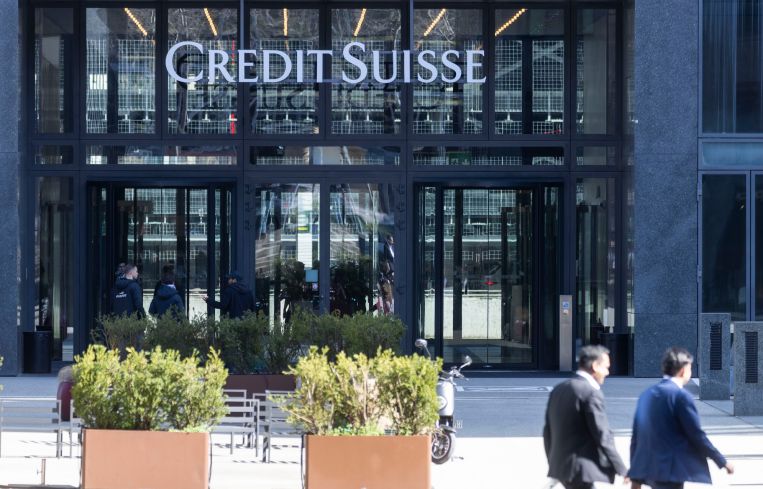Credit Suisse Receives $50B Lifeline to Ward Off U.S. Banking ‘Contagion’
By Brian Pascus March 16, 2023 12:18 pm
reprints
Switzerland’s central bank threw Credit Suisse Group AG a lifeline Thursday in a bid to stop the American banking tumult from swamping Europe. Meanwhile, the bank expects “significant losses” from its real estate business — an expectation that predates the current tumult.
The Switzerland-based megabank — which had roughly $1.3 trillion worth of assets under management at the end of 2022 — saw its stock drop 24 percent Wednesday on the SIX Swiss stock exchange. The sudden drop in share price led the Swiss National Bank — which regulates Switzerland’s financial system much like the Federal Reserve in the United States — to provide Credit Suisse with a $54 billion capital injection Thursday morning to quell concerns that the bank could go under.
Wednesday’s stock dip came on the heels of Credit Suisse’s largest shareholder — the Saudi National Bank — announcing that it would not buy more shares to stabilize the bank’s balance sheet, and an admission in Credit Suisse’s 2022 annual report, released on Tuesday, that “material weaknesses” were identified in the bank’s ability to maintain an effective risk assessment process.
It ended Wednesday trading at 1.70 Swiss francs — with 1 Swiss franc equaling roughly $1.07 Thursday — a far cry from the 52-week high of 7.40 Swiss francs and well below the 16.49 Swiss francs share price from March 2018.
Trading ticked up a bit Thursday morning to hit a high of 2.17 Swiss francs, following reports of the capital injection from the central bank.
The international bank has hit headlines for some time now, recording liquidity issues in its fourth-quarter 2022 report, in particular “significantly higher withdrawals of cash deposits,” with customer deposits declining by 138 billion Swiss francs in the fourth quarter of 2022 alone. Perhaps most noteworthy, Credit Suisse carried 156 billion Swiss francs worth of gross unrealized losses for corporate debt securities available for sale in 2022, according to the annual report.
“Credit Suisse has a history of not being a well-managed bank,” said Lawrence J. White, professor of economics at the NYU Stern School of Business.
The bank dominated headlines Wednesday as concerns around its possible failure prevailed in both the U.S. and Europe. Swiss regulators tried to calm those fears with a liquidity backstop announcement.
“Credit Suisse meets the capital and liquidity requirements imposed on systemically important banks,” the Swiss National Bank said in a joint statement with the Swiss Financial Market Supervisory Authority.
The regulators’ statement added: “The problems of certain banks in the United States do not pose a direct risk of contagion for the Swiss financial markets.”
Credit Suisse CEO Ulrich Koerner also tried to quell the panic during an appearance on Bloomberg TV on Tuesday. Koerner — who took over as CEO in July 2022 — emphasized Credit Suisse was at the beginning of “a three-year transformation” and called his firm “a globally systemic important bank.”
“It’s hard for me to imagine that the Swiss government would allow Credit Suisse to implode. They’re a major bank,” White said. “If the Swiss government does something along the lines [of a bailout], it’s a hiccup and everyone moves on.”
The increased pressure on Credit Suisse follows the failure of two regional U.S. banks — Signature Bank, one of New York City’s most active commercial real estate lenders, and Silicon Valley Bank, an active lender in the tech and venture capital sphere — which were both seized by U.S. regulators this past week.
The fallout has continued. Credit rating agency Moody’s announced this week that it placed six U.S. banks under review for a rating downgrade: First Republic Bank, Zions Bancorporation, Western Alliance Bancorp, Comerica Inc., UMB Financial Corporation, and Intrust Financial Corporation .
This domino effect of bank seizures by regulators across both sides of the Atlantic could spark a loss of depositor confidence to spread across the international banking system, according to White.
Both systems are interconnected. The European Central Bank raised interest rates by half of a percentage point Thursday, a decision likely to impact the impending interest rate quandary faced by Federal Reserve officials prior to their March 21-22 meeting next week.
For now, it’s too early to tell how the chaos at Credit Suisse will impact the suddenly fragile regional banking system in the United States.
“There are not a lot of retail customers who hold deposits at Credit Suisse who should get worried,” White explained. “But you always have to worry about contagion if one bank starts getting in trouble and depositors in other banks get worried and say, ‘Let me pull my money out now.’
“It’s the contagion effect one would worry about,” he added.
One place where Credit Suisse held major positions is the commercial real estate market.
Credit Suisse’s real estate loans — both residential and commercial — totaled 143 billion Swiss francs in 2022, according to the annual report. The firm had 17.2 billion Swiss francs worth of CMBS principal outstanding as of Dec. 31, 2022, according to the annual report.
A regular honoree on Commercial Observer’s Power Finance list, the firm was one of the top CMBS bookrunners in 2022. Credit Suisse ranked 11th in the U.S., with the firm holding 1.37 percent of the $70.06 billion market, according to Trepp data.
Credit Suisse noted that “We may incur significant losses in the real estate sector,” in its 2022 annual report.
“Our real estate related businesses and risk exposures could be adversely affected by any downturn in real estate markets, other sectors and the economy as a whole. Should these conditions persist or deteriorate, they could create additional risk for our commercial real estate related businesses,” according to the 2022 report.
Notable Credit Suisse commercial real estate deals from 2022 include a five-year, $230 million loan extended to developer National Resources for a 1 million-square-foot Lionsgate Studios project in Yonkers, N.Y., and the $835 million purchase of the Diplomat Beach Resort in Hollywood, Fla., that was financed together with Trinity Investments.
New York-based Apollo Global Management acquired a significant portion of Credit Suisse’s Securitized Products Group in February 2023 following a November 2022 agreement.
It’s unclear whether the spillover from concerns about Credit Suisse’s stability will impact other U.S. institutions going forward.
Kairong Xiao, associate professor of finance at Columbia University Business School, said most U.S. firms are protected from the present drama surrounding Credit Suisse.
“The major U.S. banks have been reducing their exposure to this bank for a long time,” Xiao said. “This is not the same situation as we were in in 2008. For Credit Suisse, we know that it has been in trouble for a long time now.”
Credit Suisse declined to comment.
Brian Pascus can be reached at bpascus@commercialobserver.com


